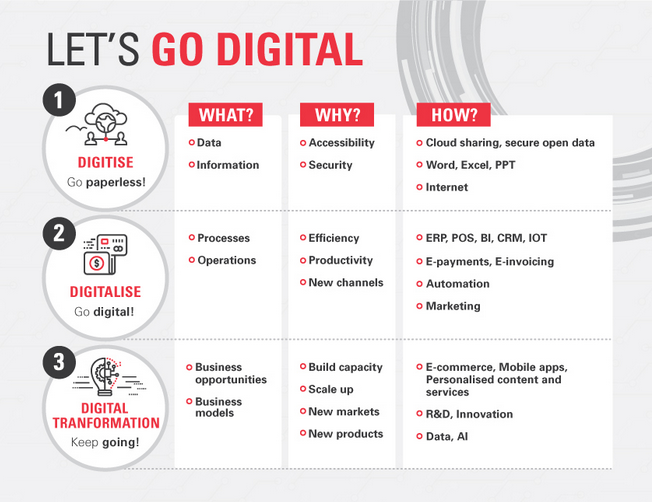Digitisation refers to the integration of digital technologies into business/social processes with the aim of improving them.
Already in recent years, a tendency towards more digitalisation has been visible in many companies. However, the developments are definitely accelerated by the current situation. Companies are realizing the risks they run if they do not have a digital strategy and cannot switch to alternative working methods and sales channels in an emergency. Many are only now realizing the importance of digital transformation for their economic survival. Accordingly, numerous measures for the digital transformation of individual areas are likely to be introduced in the coming months. Companies are offered great opportunities by this drastic trend. However, the path to digitalisation is full of challenges. In this article, we will introduce you to what digitization is and what it can mean for your business.
Opportunities & challenges
Digitisation is both a challenge and an opportunity. On the one hand, it puts pressure on companies that do not have the necessary structures to adapt quickly and flexibly to market changes. On the other hand, it holds growth potential for those companies that consistently implement their digital transformation.
However, this can only succeed if companies take a holistic approach. In the long term, digital transformation is a process that affects all business areas, from product development and manufacturing to customer departments such as marketing and sales. Companies that see the use of digital technologies only as an opportunity to increase efficiency and save costs fail to recognize the potential for change offered by digital transformation. In the long term, structures that enable companies to develop new products and revenue models quickly and flexibly are more important.

The potential benefits of digitisation are better workflows, greater efficiency, improved products, and completely new services that are part of the process. These benefits give rise to others, such as improved competitiveness.
If digitisation is done right, companies also benefit in:
- New customer acquisition channels.
- Improved working conditions and better employee retention.
- Improved decision making.
- More willingness to innovate.
- Better teamwork.
Advantages of digitisation
The advantages of digitisation are:
- Improved manufacturing processes.
- Products can be brought to market faster.
- Reduced reaction times to customer feedback.
- Improved insights.
- Entire supply chains can benefit from end-to-end integration.
- Lower production costs.
Development processes
The individual business digitization processes can be divided into different levels: from completely manual to completely software-driven.
Every company has a fixed number of processes that are supported by software to varying degrees. Basically, the degree of digitization of a company corresponds to the sum of the digitization levels of its processes.
The levels represent the development from a completely analog to a completely digital company.
Your digital possibility plan:
Creating the conditions for home office

Remote Work and Digital Workplace are not empty words of the New Work movement, but an important building block of digital resilience. In order to be able to work remotely, technological requirements, such as the setting up of a VPN and cloud-supported SaaS, such as collaboration tools like WebEx, Slack, or teams, must be fulfilled as quickly as possible. The integration of telephony into IP- and IT-based communication solutions is also essential.
Anchoring collaboration and activity in the corporate culture
In the current tense situation, cross-functional and decentralized teams offer significantly higher problem-solving competence than homogeneous, local ones. Such virtual teams are already used to communicating remotely with each other. The changeover is not too big for them. It is also advisable to create dashboards that allow the board of directors and management to see the status quo in real-time. This can include progress on specific projects, but also variations in order intake or cash flow, to name just a few.
Establish cloud computing and manage data decentrally
Companies that are already well on their way to the cloud have a clear competitive advantage in the crisis. When revenues are declining and less IT capacity is needed, costs fall with an on-demand model. On-premises networks do not offer this scalability option. A further advantage of the cloud is data storage in decentralized data centers. Even if problems arise at one location, the impact is minimal. In addition, cloud computing offers flexibility in the use of individual services and APIs, so that not only can innovations be driven forward even in times of budget cuts, but day-to-day business can also be kept running more easily.
Data Analytics enables transparency, traceability, and forecasting
If a company has been developed in the direction of a Data-Driven Company, it pays off now at the latest. AI and analytics significantly improve simulation and forecasting capabilities so that decisions can be made based on facts. Stress testing provides insight into how unforeseen situations can affect inventory levels, delivery dates, and staff availability, for example.
Focus on digital products and IoT
Companies whose products are available digitally are less affected by crises. Online trade, for example, has seen significant growth since the outbreak of Corona, especially in urban locations. Digital self-services such as chatbots or live chats also support customers who have not previously shopped online. In the industrial sector, service providers offering remote maintenance services, for example on the basis of augmented reality, or manufacturers of networkable machines are now in particular demand. Innovative technologies offer the possibility of maintaining operations even in cases of illness among the workforce because they allow certain procedures and processes to be automated.
The COVID 19 epidemic shows how digitalisation can at least soften crises. As a result, companies are well-advised to invest in new technologies. Instead of panicking in the face of this frightening situation, the establishment of an emergency plan is the strategy of the hour. IT, in particular, plays an important role in this.






